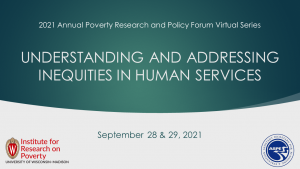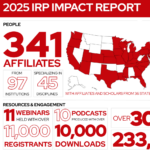Events
- January
- January 21From Service to Stability: Navigating Financial Well-Being, Food Security, and the Civilian WorkforceInstitute for Research on Poverty Webinar - Dawne Vogt, Nipa Kamdar, and Daniel Peat1:00 PM, Online
- January 22Powers and Practices in Labor Standards EnforcementInstitute for Research on Poverty Seminar - Daniel Galvin12:15 PM, 8417 Sewell Social Sciences
- January 29A Chip Off The Old Block? Genetics and The Intergenerational Transmission of Socioeconomic StatusInstitute for Research on Poverty Seminar - Silvia Helena Barcellos12:15 PM, 8417 Sewell Social Sciences
- February
- February 5Child Protective Service Involvement and Parental Economic Precarity: Evidence from System-Impacted ParentsInstitute for Research on Poverty Seminar - Margaret Thomas12:15 PM, 8417 Sewell Social Sciences
- February 12How Things Fall Apart: The Excuses America Makes for Housing in DisrepairInstitute for Research on Poverty Seminar - Robin Bartram12:15 PM, 8417 Sewell Social Sciences
- February 19Not All Bids Are Equal: Racial and Liquidity Gaps in Housing MarketsInstitute for Research on Poverty Seminar - Lu Han12:15 PM, 8417 Sewell Social Sciences
Highlights from the National Research Center on Poverty and Economic Mobility
 This Forum investigated inequitable outcomes by race, ethnicity, sexual orientation, gender identity, sex, and ability and how federal, state, and local human services policies, systems, and providers contribute to it. Participants also discussed how policy, practice, data, and research can combat systemic inequities created in and outside of human services. Inequities continue to create barriers to success and well-being for many individuals and communities in the United States. The field of human services can play a crucial role in advancing equity for these populations, but to do so must identify the ways in which it creates or perpetuates disparities.
This Forum investigated inequitable outcomes by race, ethnicity, sexual orientation, gender identity, sex, and ability and how federal, state, and local human services policies, systems, and providers contribute to it. Participants also discussed how policy, practice, data, and research can combat systemic inequities created in and outside of human services. Inequities continue to create barriers to success and well-being for many individuals and communities in the United States. The field of human services can play a crucial role in advancing equity for these populations, but to do so must identify the ways in which it creates or perpetuates disparities.
Medicaid & Health Policy Research
Health Coverage, Access, Cost, & Quality
Research and analysis projects focus on health care access, cost, financing, health system performance, quality — in short: What works? Who benefits? Who pays?


